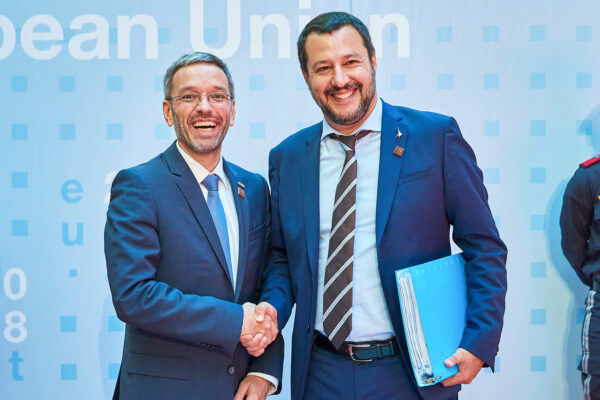
Italy’s Matteo Salvini tried to be all things to all people, and failed.
The leader of the (formerly Northern) League aspired to become the next Silvio Berlusconi: the uncontested leader of the Italian right. To prove he could govern, he formed a coalition with the anti-establishment Five Star Movement and later supported the unity government of Mario Draghi.
But you can’t govern in Italy without making compromises, and that’s not something far-right voters tend to reward. Salvini has oscillated between mock statesmanship and populism, giving his supporters whiplash. Giorgia Meloni’s postfascist Brothers of Italy now threaten to eclipse him.
Mistake
Salvini’s original sin was to poison his coalition with the Five Stars barely a year after it had come to power. His hope was to trigger snap elections, which polls at the time predicted the League would win.
But the Five Stars traded Salvini for the social democrats and remained in power. The League has been in freefall since, going down from almost 40 percent support to under 20 percent in two years. Right-wing voters saw Salvini for the opportunist he was and haven’t forgiven him for leaving Italy with a center-left government.
The Brothers of Italy, who won less than 5 percent in the 2018 election, are neck and neck with the League in the polls. Even Berlusconi’s Forza Italia has seen a mild rebound in some surveys.
In local elections this month, the Brothers equaled or bested the League in four of Italy’s major cities, including Salvini’s hometown Milan.
Credibility
Salvini tried to regain his credibility by joining Draghi’s government, which includes all major parties except the Brothers. The League’s powerful northern governors — Federico Fedriga of Friuli Venezia Giulia, Maurizio Fugatti of Trentino and Luca Zaia of Veneto — applauded that decision.
But it didn’t help the League in the polls.
Salvini returned to theatrics, ordering his ministers to storm out of a cabinet meeting when it debated tax reforms. The League argued Draghi’s proposed rationalization of Italy’s byzantine tax laws could result in higher levies for property owners.
It was a move the governors could tolerate. They know the League’s core voters are northern homeowners.
Salvini went too far when he spoke out against the government’s proposed coronavirus certificate.
Vaccines
Italy, which lost 130,000 people to COVID, is imposing one of the strictest vaccine mandates in the world, requiring not just public- but all private-sector workers to get either vaccinated or tested regularly. Those who refuse will lose pay.
Eight in ten Italians are vaccinated.
Salvini, who early during the pandemic tweeted out the unproven theory that coronavirus was created in a Chinese lab, drew the ire of his party’s northern barons, his own top minister in the government, Giancarlo Giorgetti, and Forza Italia. They all believe the mandate is crucial to reopen Italy’s economy, which contracted 9 percent last year.
Under pressure, Salvini U-turned again and voted for the health pass after all.
The Brothers did not. Like Éric Zemmour in France and Republicans in the United States, they have found a way to tap into anti-vax and anti-establishment sentiment. Unlike Salvini, they have done this consistently — and it’s what one in five Italians want.
